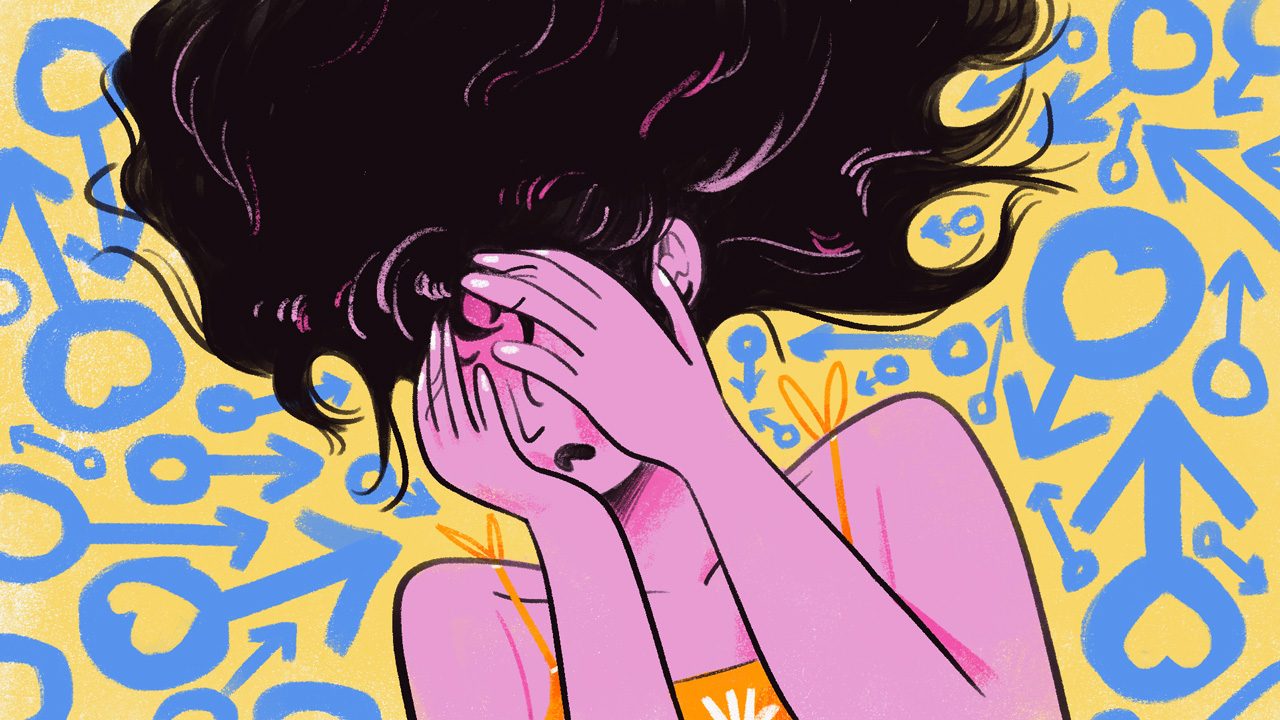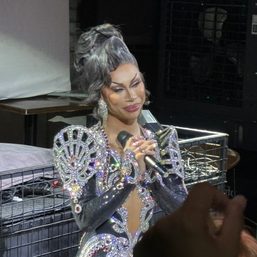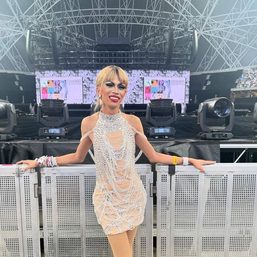SUMMARY
This is AI generated summarization, which may have errors. For context, always refer to the full article.

When I started questioning my sexuality, I found myself watching a lot of coming out videos. Through this, I was exposed to a diverse set of queer stories. While there’s no one-size-fits-all approach to every queer person’s journey, a particular narrative kept popping up: “I think I’ve always known.”
They would always point to specific moments in their lives when their sexuality was clearly brought to the surface. Looking back, could it be my intense fascination with Sailor Uranus from Sailor Moon and Shego from Kim Possible as a kid? Could it be all the times that I blushed and fumbled at the sight of women wearing sundresses? Maybe it’s in the way that I’ve oftentimes pictured women in place of my male partners during intimate moments.
In college, I was lucky enough to be put in a progressive and inclusive academic institution. It became a safe space that granted me the freedom to explore my gender identity and sexuality. It dawned on me then that I couldn’t ignore my immense attraction towards women anymore. At the same time, however, I also couldn’t overlook my desire to still be found attractive by men. I craved male validation so much that I kept appealing to their gaze despite my aversion towards them.
I thought I was alone in this feeling; maybe I’m just a straight girl faking it for attention (even if this was an internal struggle that I never told anyone)? That was until I came across a word on the internet that perfectly captured my dilemma: compulsive heterosexuality or, for short, “comphet.”
What is compulsive heterosexuality?
Comphet has been the subject of many online contemporary queer discourse. It was featured in the controversial ”Am I a Lesbian?” Masterdoc, a 31-page informal self-reflection manual for women who were unsure of their sexual orientation that was first released by Angeli Luz (@cyberlesbian) on Tumblr in 2018. Recently, this guide earned popularity once more on TikTok, with many people either resonating with its content or criticizing its accuracy.
Luz defined comphet as the societal conditioning that all women are inherently attracted to men. It is a byproduct of heteronormativity or the assumption that being straight was the default for everyone. “We’re trained from birth to believe that we will find someone of the other binary gender, fall in love…in a million tiny ways, we’re taught that only relationships with the other binary gender are valid,” the masterdoc reads.
“Compulsive heterosexuality is the voice in [your] head that says ‘I must really be [heterosexual] even when I’m in love with a woman,” Luz noted.
This concept is actually not new. The term was first coined in the 1980s by the Marxist-feminist writer Adrienne Rich in her essay titled “Compulsory Heterosexuality and Lesbian Existence.” Here, she argued that comphet must be analyzed within the context of oppressive systems like patriarchy and capitalism. In our society, sexuality had been commodified and heterosexuality was considered leverage. Essentially, if you’re a woman, you’re conditioned into thinking that your worth was hinged on male validation.
The writer explained that the limited career opportunities given to women back then underlined the economic imperatives of catering to men. Women were forced to play on their own objectification and “market sexual attractiveness to men, who tend to hold the economic power” if they wanted to survive.
Such a dynamic was further reinforced through the socialization of women through media and literature, asserted Rich. As little girls, we read love stories of princesses and princes that portray sharing a “true love’s kiss” with each other as the ultimate form of “happily ever after.” As we grow older, we see reiterations of this narrative in almost every cartoon, drama, reality show, movie, book, and more. Then, once we approach a certain age, the nudge towards settling down and starting a family would intensify, usually coming from well-meaning family members who believe that the alternative to such would be dying miserable and alone.
One may argue that Rich’s framework has ceased to stay relevant today, because gender inequality has lessened over time – after all, we’re already living in the era of the #girlboss. Still, underneath hollow notions of empowerment and equality, comphet remains deeply embedded in the female experience.
From a very young age, women are taught that male validation was a limited currency that dictated our value in society. We are pressured into changing our personalities, our interests, and our appearance to be more palatable to their tastes. We are only deemed beautiful when men find us desirable. We are seen as “bitter” and “unhappy” when we’re not selected by a man in the dating market. If we’re not married with kids by the age of 30, we are branded as failures – as if our personal fulfillment does not matter.
It is through such pervasive double standards and expectations that the societal pressure to be in a heterosexual relationship persists.
Comphet and the lesbian experience
The lesbian experience is often described as isolating – because, in a world built by men for men, you’d have to unlearn the societal conditioning that you’re life must revolve around them.
Josephine de Jesus, a 21-year-old lesbian, recounted how it was so much easier for her to accept that she liked women than it was for her to acknowledge that she was not at all attracted to men. She recalled how, despite only feeling attraction towards the same sex, labeling herself as a “lesbian” was not even an option that she considered until much later.
“Nung una akong nagkagusto sa babae, isang taon pa bago ko talagang natanggap yung sarili ko. Sobrang in denial pa ako. Ayoko eh, di ko tanggap yung sarili ko noon,” she said.
(“When I first felt attraction towards women, it took me a whole year before I came to terms with it. I was super in denial. I rejected it, I couldn’t accept myself back then.”)
She attributed her dilemma to how she was brought up. “Growing up, simula elementary siguro hanggang high school, nakatatak na sa isip ko na yung validation ay pwede mo lang makuha sa lalaki (Growing up, from elementary to high school, I already had it in my mind that I can only get validation from men),” De Jesus professed. She added that as a result, when she was younger, she based her sense of self-worth on the attention that boys showed her.
However, when she briefly tried dating men during her teenage years, it became more apparent that this was not what she really wanted.
“Iniisip ko na, baka nung una pa lang talaga, ayoko na sa lalaki. Kaya lang naman siguro ako pumatol sa lalaki kasi yun lang yung nakikita ko. Akala ko ayun lang yung tama, akala ko yun lang yung pwede.”
(“I realized, maybe I was never attracted to men in the first place. Maybe the only reason I’ve ever experienced attraction is because that’s all I’ve ever been exposed to. I thought it was the only right option, the only allowed option.”)
The road to acceptance had not been smooth for her, given that her identity was shrouded by decades’ worth of conditioning that she constantly had to question. “Habang tumatagal na tinatanggap ko yung sarili ko, masaya pero sobrang hirap. Ang daming ilalagay ng tao sa utak mo. May mga tao na akala mo tanggap ka na pero hindi pa pala. Kailangan kong tatagan ang loob ko kasi hindi siya madali,” she noted.
(“The more I came to terms with who I was, the more I understood that it would be both happy and difficult. People would try putting so many ideas into your head. Just when you think that they have finally accepted you, you’d find out that they really do not. I had to be stronger because it had not been easy.”)
Is it comphet or internalized biphobia?
One of the major criticisms that the “Am I a Lesbian” masterdoc got was how it could be interpreted as an erasure of bisexuality. While it’s true that a woman, who likes other women, may feel compelled to like a man because of comphet, it’s also possible for her to just genuinely feel attraction towards both.
The question here is: how can we tell which is which?
For de Jesus, there was a notable difference between what she felt for women in comparison to what she felt for men. “Yung attraction ko sa girls, parang – alam mo yun – malalim. Kaya ko mag-commit if ever na maging mutual yung feelings namin (My attraction towards girls, it felt – you know – deeper. I knew I could commit to our feelings if they ever became mutual),” she said.
“Sa lalaki naman, naa-appreciate ko kapag malinis, masarap kausap, may sense of humor. Pero kapag dumating yung panahon na nalaman kong gusto niya ako, it’s a big no for me (With guys, I can appreciate if they look neat, if they’re fun to talk to, if they have a sense of humor. But the moment that they express interest in me, it’s a big no for me),” she added.
Meanwhile, Chay, a bisexual woman, explained that she felt an equal amount of attraction for both men and women. “Since I had a gay awakening, that’s when I first felt that, ‘Wow, I’m attracted to a woman.’ Then, when some guys hit on me, I thought, ‘I want to give this guy a chance,’” she recalled. “I have equal attraction to both genders, I want to take it seriously whatever the gender is.”
Chay also noted that some bisexual people may have preferences – and that’s valid. The verdict lies in whether or not they can envision themselves being content in a relationship with both men and women.
It’s okay to not know the answer
Questioning one’s sexuality could be a liberating but conflicting experience. On the one hand, it brings us one step closer to self-acceptance. On the other hand, it also brings in a whole lot of uncertainties. Labels can be confusing, attraction can feel complicated, and relationships can be challenging to navigate.
Hence, if you’re struggling with your sexuality, we’re here to tell you that it’s okay. You can take your time in finding the answers – sexuality is fluid anyway. It’s okay to explore your identity. It’s okay to adopt a label that resonates with you in the present. It’s also okay if you happen to change your mind somewhere along the process. Your journey is your own and no one can take that from you.
“Minsan paulit-ulit nating kinikwestyon kahit alam na natin yung sagot, kasi nga hindi natin tanggap ang sagot – and that feeling is valid (Sometimes we keep on dwelling on the questions despite already knowing the answers, because we find it difficult to accept what we already know – and that feeling is valid),” De Jesus remarked.
“Little by little, accept yourself. The rest of the world can wait until you’re certain and ready,” she concluded. – Rappler.com
Add a comment
How does this make you feel?
![[Rappler Investigates] Dangers of TikTok](https://www.rappler.com/tachyon/2024/04/dangers-tiktok-april-18-2024.jpg?resize=257%2C257&crop=309px%2C0px%2C1080px%2C1080px)




There are no comments yet. Add your comment to start the conversation.